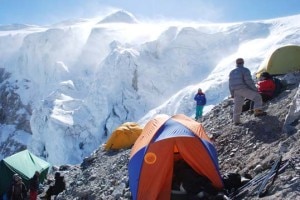Tourism sector called to act on disaster reduction measures

KATHMANDU, Nepal- Stating that the tourism destinations in Nepal are located in the areas that are prone to sudden on-sets of natural disasters, tourism experts, entrepreneurs and stakeholders have called for collective effort to tackle them.
During a workshop titled ‘Need for Disaster Preparedness in Tourism Industry’, that was jointly organized by Nepal Tourism Board, Himalayan Rescue Association (HRA), Nepal-USA Chamber of Commerce and Industry and National Society of Earthquake Technology (NSET)-Nepal with support from USAID/OFDA on Tuesday, representatives from the tourism sector expressed the need for holistic disaster reduction preparedness and crisis management.
“Tourism destinations here are naturally located in areas that are prone to sudden on-sets of natural disasters, in particular, dense settlement areas, old historical towns, river valleys and mountains,” speakers said during the workshop.
Speaking at the workshop, Acting chief executive officer of NTB Subash Nirola said that the tourism industry has resource limitations in managing natural disasters. “We are talking about greater risks for which we need to have more advanced technology and there must be coordination between the government and the private sector,” he said. Nirola also expressed Nepal Tourism Board’s commitment to fund the Tourism Emergency Response Centre.
President of HRA Santa Subba expressed the need for proper rescue operation and crisis management in the tourism sector. “Professionals working in the tourism sector should be given proper training as part of disaster preparedness.”
Subba also informed about the formation of the Tourism Emergency Response Centre. The centre, which was formed by HRA in collaboration with Nepal Tourism Board (NTB), will help manage crisis in case of a disaster in tourism sector.
Meanwhile, executive director of NSET – Nepal Amod Mani Dixit highlighted the role of the private sector in earthquake risk management. He also pointed out the importance of the tourism industry and its contribution to the national economy.
Dixit spoke about his plan to work with the tourism industry to prepare tourism stakeholders and help them continue with uninterrupted tourism business even if there is a large earthquake in the country.
US ambassador to Nepal Peter W Bodde appreciated the efforts of the government to mitigate adverse impacts of potential threats. He also emphasised the significance of ‘Promoting Public Private Partnership for Earthquake Risk Management (3PERM)’ programme, which is being implemented by NSET- Nepal in bringing the level of commitments and potential resources and leadership of private sector including the tourism industry to consider Earthquake/Disaster Risk Management as one of the priority areas for mainstreaming into the development process.

